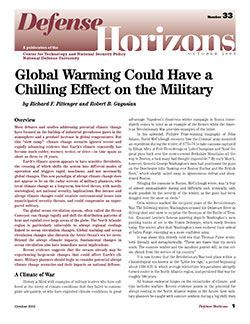DOWNLOAD PDF
 Overview
Overview
Most debates and studies addressing potential climate change
have focused on the buildup of industrial greenhouse gases in the
atmosphere and a gradual increase in global temperatures. But
this “slow ramp”1 climate change scenario ignores recent and
rapidly advancing evidence that Earth’s climate repeatedly has
become much colder, warmer, wetter, or drier—in time spans as
short as three to 10 years.
Earth’s climate system appears to have sensitive thresholds,
the crossing of which shifts the system into different modes of
operation and triggers rapid, non-linear, and not necessarily
global changes. This new paradigm of abrupt climate change does
not appear to be on the radar screens of military planners, who
treat climate change as a long-term, low-level threat, with mostly
sociological, not national security, implications. But intense and
abrupt climate changes could escalate environmental issues into
unanticipated security threats, and could compromise an unprepared
military.
The global ocean circulation system, often called the Ocean
Conveyor, can change rapidly and shift the distribution patterns of
heat and rainfall over large areas of the globe. The North Atlantic
region is particularly vulnerable to abrupt regional coolings
linked to ocean circulation changes. Global warming and ocean
circulation changes also threaten the Arctic Ocean’s sea ice cover.
Beyond the abrupt climatic impacts, fundamental changes in
ocean circulation also have immediate naval implications.
Recent evidence suggests that the oceans already may be
experiencing large-scale changes that could affect Earth’s climate.
Military planners should begin to consider potential abrupt
climate change scenarios and their impacts on national defense.
READ MORE >>